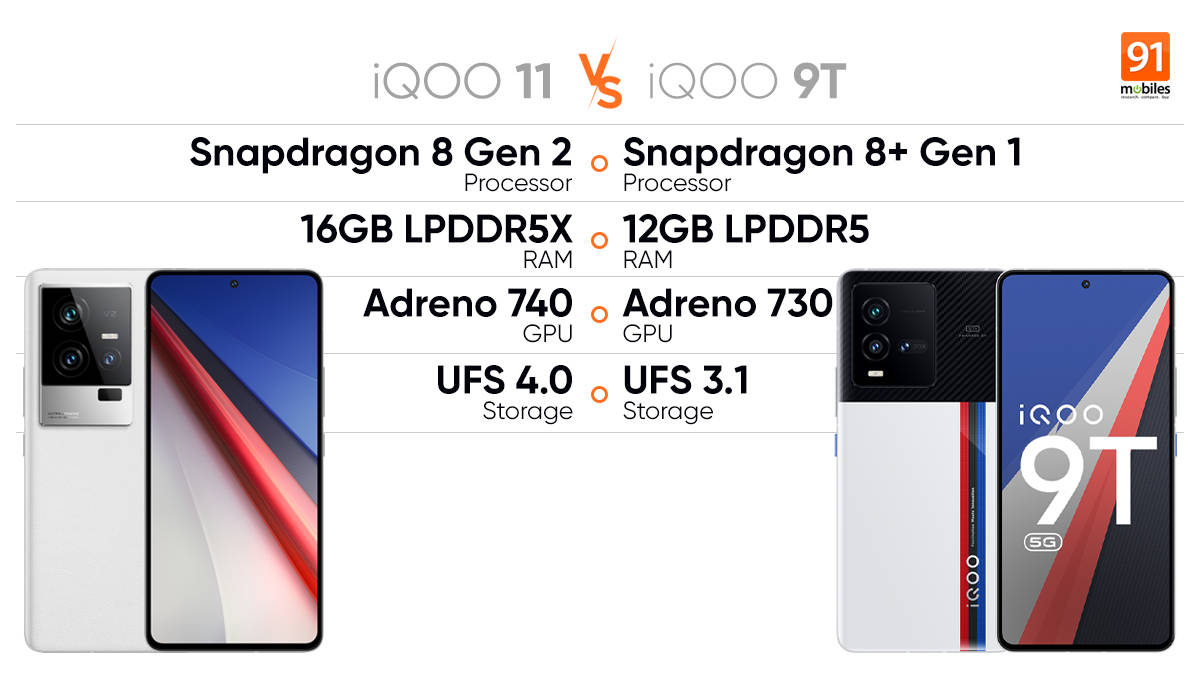
Brand iQOO has just revealed what it claims to be the fastest smartphone in the world. The iQOO 11 (review), priced starting at Rs 59,999, is the first phone in India to harbour the flagship Qualcomm Snapdragon 8 Gen 2 SoC. iQOO has always prided itself in focussing on performance on its devices and in my review of the iQOO 11, I felt the idealogy resonate soundly.

There are other factors as well that make the device highly processing-centric, such as the use of LPDDR5X RAM and UFS 4.0 storage. Not to mention there’s a ginormous vapour cooling chamber housed inside and a dedicated V2 chip to make heavy-duty gaming more efficient and enjoyable. However, iQOO released another very performance-centric phone last year called the iQOO 9T (review). Now that device came powered by the Snapdragon 8+ Gen 1 SoC, Qualcomm’s previous flagship chipset, so it would be interesting to see how well the 9T fares against the iQOO 11 as far as performance is concerned.

First let’s talk about the Snapdragon 8 Gen 2 from Qualcomm, an SoC that will start to penetrate the flagship smartphone market as the year goes by. It is an octa-core chipset designed using a 4nm fabrication process by TSMC. Instead of using the 8 Gen 1’s approach of 1-3-4 CPU cores, the 8 Gen 2 has a 1-2-2-3 architecture. This includes the new Cortex X3 super core clocked at 3.2GHz along with two performance Cortex A715 cores and two Cortex A710 cores, both spinning at 2.8GHz. The remaining three are efficiency Cortex A510 cores spinning at 2GHz, completing the ensemble.
As an advantage, the 8 Gen 2 has four performance clusters as opposed to the three on the 8+ Gen 1 from last year. Also, the latter made use of only the Cortex A710 CPUs while the former has the upgraded A715. Finally, the Snapdragon 8 Gen 2 uses the new Adreno 740 GPU, which, among other things, can also enable ray-tracing in supported games.
Table of Contents
Geekbench 5
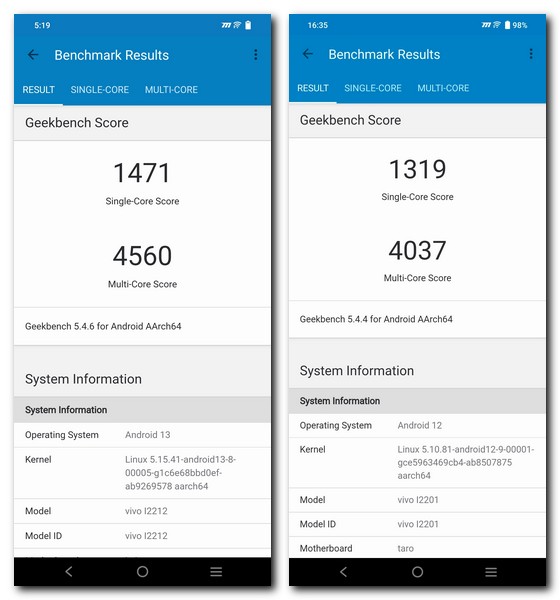
A quick look at the Geekbench scores on both the iQOO 9T and 11 shows us the latter’s slender lead on the former. The multi-core and single-core result on the iQOO 11 is 1,471 and 4,560 while for the iQOO 9T, the scores are 1,319 and 4,037. With just a 10 percent jump, the iQOO 11’s single-core performance is not exactly far ahead of the iQOO 9T. The same is also true for the multi-core test which also sees about a 10 percent increase.
Antutu V9
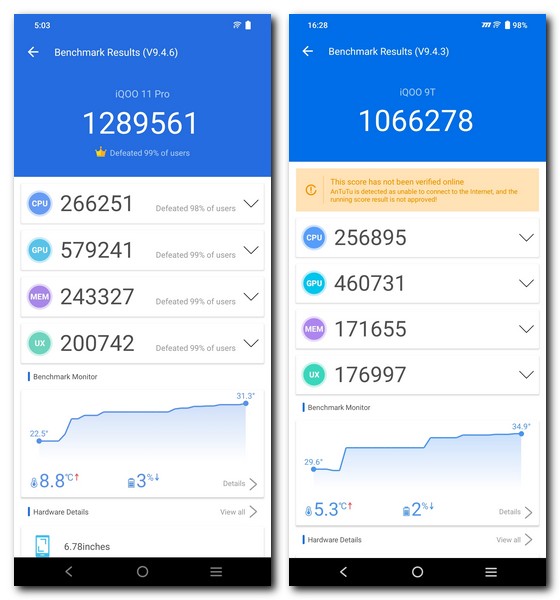
The overall score on Antutu provided by the iQOO 11 is 1,289,561 while the iQOO 9 outputted 1,066,278. As a measure of percentage gain, iQOO’s latest flagship is ahead by a margin of 18 percent. The biggest gains, when compared to the iQOO 9T, are in fact in the memory and graphics tests thanks to the new LPDDR5X RAM and Adreno 740 GPU. It’s also worth noting even though the iQOO 11 has gained more temperature while conducting the test, it’s because the initial temps on the device were much lower than the iQOO 9T.
CPU Throttle
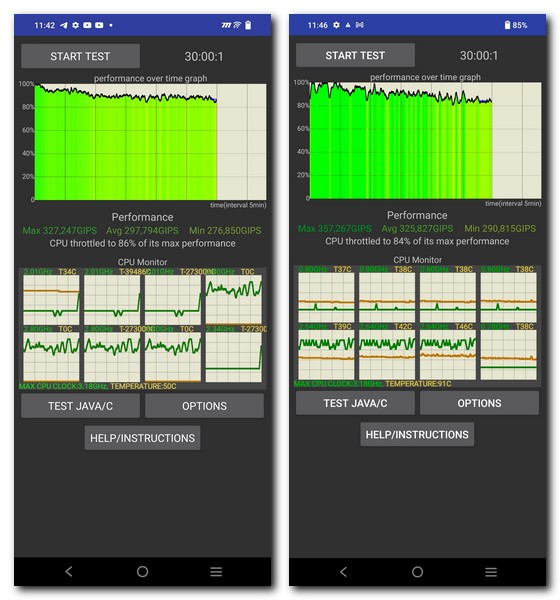
When running the CPU Throttle benchmark to gauge how well the SoC handles things under sustained load, there isn’t much to separate the two iQOO phones. On the Snapdragon 8 Gen 2-powered iQOO 11, the CPU could function at 86 percent of its maximum capacity for a test run of 30 minutes. In the case of the iQOO 9T this figure was 84 percent during the same time period.
3DMark Wild Life Extreme Stress Test
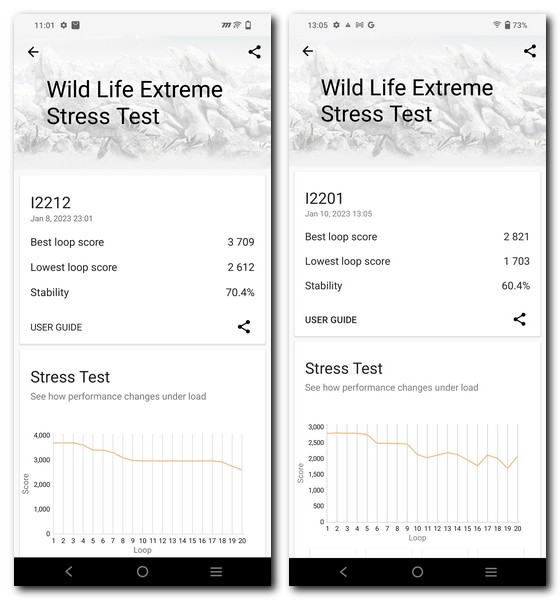
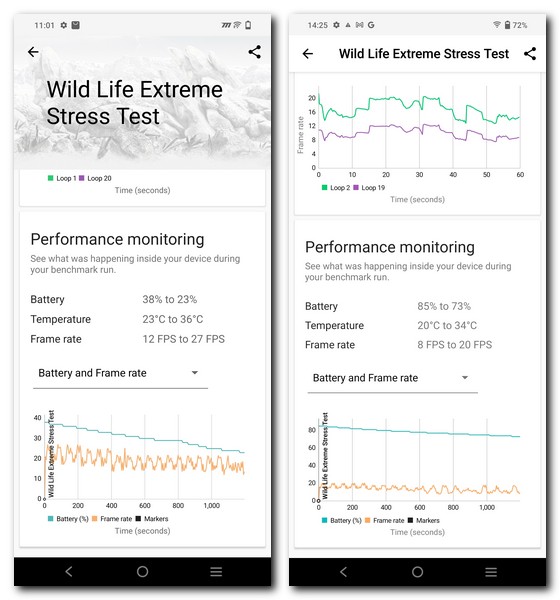
The GPU capabilities are just as important as the CPU and for this 3DMark is the benchmark to go with. The Wild Life Extreme Stress test puts a device’s graphical capabilities on full display and provides a stability score at the end. Here the iQOO 11 does take a discernible lead with its best loop score of 3,709 compared to 2,821 on the iQOO 9T. As a matter of fact, the former’s lowest loop score is just shy of the latter’s best attempt. This gives the iQOO 11 a stability score of 70.4 percent and the iQOO 9T has to settle for 60.4 percent. Both devices have about an equal battery drop and temperature gain for the test’s duration although the iQOO 11 managed to push more frames than the 9T.
Cross Platform Disk Test
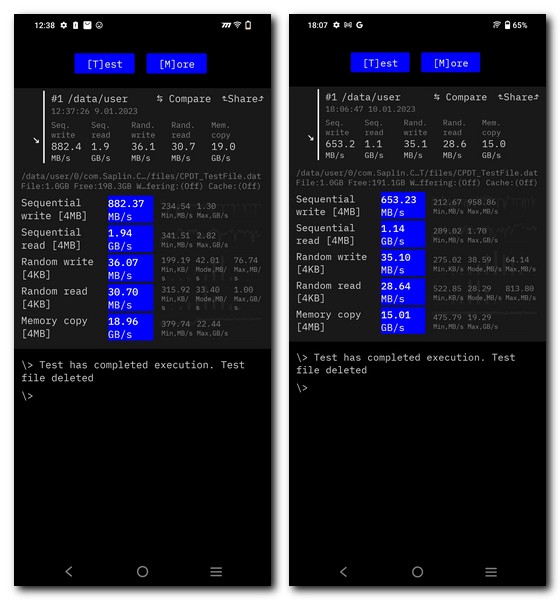
Both iQOO phones have some of the fastest read/write speeds in the Android world but the iQOO 11 pips the 9T thanks to its UFS 4.0 storage. The sequential write and read speeds on the iQOO 11 are 882MB/s and 1.94GB/s respectively compared to 653MB/s and 1.14GB/s on the 9T.
Gaming test
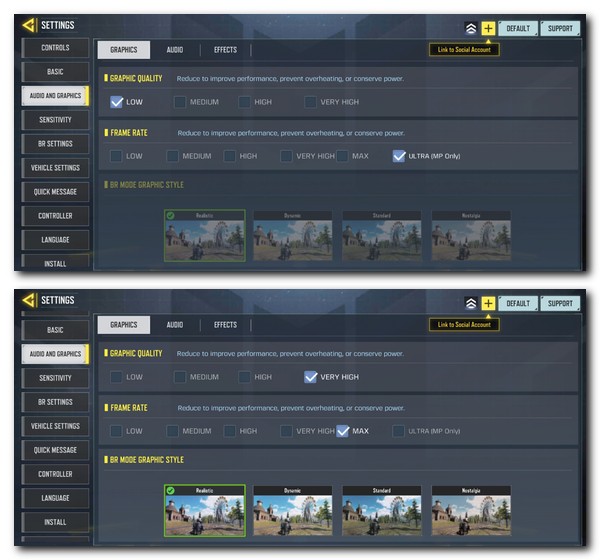
Call of Duty: Mobile is the game of choice for me after the ban of BGMI on the India Play Store. However, when it comes to the two iQOO phones, there’s really no difference in terms of the gaming experience. Both can turn on Ultra (90fps) mode at Low graphics or can do Max (60fps) at Very High graphics. I ran the game for about an hour on each and there was not a moment where I encountered even a single lag in the frame rate or a poor render in the graphics. What I can say for sure is that the back panel on the iQOO 9T felt a bit warmer in comparison. In short, the better GPU on the iQOO 11 has little to no difference when playing a title like CoD: Mobile.
Verdict
From these tests, I can say that while the iQOO 11 is surely the fastest phone on the market right now, the iQOO 9T is no slouch either. The latter may not trump the iQOO 11 in any of the benchmark or gaming comparisons, but for its price, users with performance needs would not find a better device than the 9T. Of course, the iQOO 11 holds some other trump cards up its sleeves pertaining to the wider smartphone experience. There is also the capability of the Snapdragon 8 Gen 2 to implement hardware ray tracing on select mobile titles. However, just from the standpoint of processing prowess, there’s not a lot to separate the two iQOO phones.












